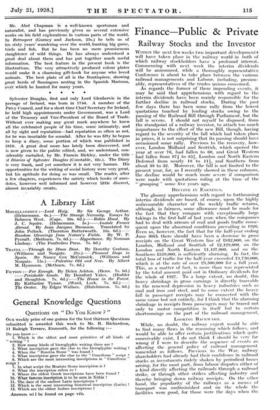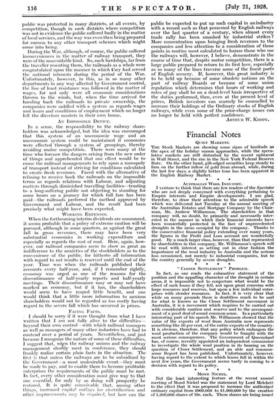Finance-Public & Private
- Railway Stocks and the Investor
WITHIN the next few weeks two important developments will have taken place in the railway world in both of which railway stockholders- have a profound interest. Commencing with next week the interim dividends will be announced, while a thoroughly representative Conference is about to take place between the various railroad managements and Labour, including, presinn- ably, representatives of the trades unions concerned.
As regards the former of these impending events, it may be said that apprehensions with regard to the interim dividends have been mainly responsible for the further decline in railroad stocks. During the past few days there has been some rally from the lowest quotations touched by leading stocks owing to the passing of the Railroad Bill through Parliament, but the fall is severe. I should not myself be disposed, from the standpoint of a railway investor, to attach too much importance to the effect of the new Bill, though, • having regard to the severity of the fall which had taken place in prices,, it is not surprising that its passing should have occasioned sonic rally. • Previous to the .recovery, how- ever, London Midland and Scottish, which opened the year at over 76, had fallen to 60, and Great Western had fallen from 974 to 854, London and, North Eastern Deferred from nearly. 18 to 114, and Southern from about 38 to 32. Moreover, the fall is not limited to the present year, for, as I recently showed in these columns, the decline would be much more severe if comparison were made with quotations ruling at the time of the " grouping " some five years ago.
DECLINE IN EARNINGS. •
The gloomy apprehensions with regard to forthcoming interim dividends are based, of course, upon the highly unfavourable character of the weekly traffic returns, although, in fairness, some allowance must be made for the fact that they compare with exceptionally large takings in the first half of last year. when the companies had to deal with arrears of coal and goods traffic conse- quent upon the abnormal conditions prevailing in 1926. Even so, however, the fact that for the half-year ending June 30th there. should have been a decrease in gross receipts on the Great Western line of £832,000, on the London, Midland and Scottish of £2,129,000, on the London and North Eastern £1,457,000, and on the Southern £359,000, is sufficiently alarming. In fact, the total loss of traffic for the half-year exceeded £4,750,000, which is at the rate of over £9,500,000 for a full year. This, as a matter of fact, is more than was represented by the total amount paid out in Ordinary dividends for the whole of 1927. • To a large extent, no doubt, this heavy shrinkage in gross earnings is' directly traceable to the renewed .depression in heavy industries such as coal and iron and steel, and to some extent the heavy fall in passenger receipts may he connected with the same cause but not entirely, for I think that the alarming shrinkage in receipts from passengers may he traced not only to motor competition in itself but to certain shortcomings on - the part of the railroad management.
LOOKING BACKWARD.
While, no doubt, the railway expert would be able to find many flaws in the reasoning which follows, and would- be able to offer certain justifications which quite conceivably exist, I do not think I should be very far wrong if I were to describe the sequence of events as affecting the general policy of railroad management somewhat as follows. Previous to the War, railway Shareholders had already had their confidence in railroad Stocks as investments rudely shaken by periodical losses arising, for the most part; from labour disputes either of a kind directly affecting the railroads through a railroad strike, or- through other strikes affecting industry and thereby bringing down railway receipts. On the other hand, the popularity of the railways as a mew.; of transport was undiminished and on ' the whole the facilities were good, for those were the days when the public was protected in many districts, at all events, by competition, though in „such districts where competition was not in evidence the public suffered -badly in the matter of local services, and the way was even then being prepared for .success to any other transport schemes which might come into being.
During the War, although, of course, the public suffered inconveniences in the matter of railway transport, they were of the unavoidable kind. So, such hardships, far from the traveller resenting them, the railroads as a whole were congratulated upon the manner in which they had served the national interests during the period of the War. Unfortunately, however, in this, as in so many other departments in any way affected by Government control, the line of least resistance was followed in the matter of wages, for not only were all economic considerations thrown to the winds, but, when the time arrived for handing back the railroads to private ownership, the companies were saddled with a system as regards wages and hours and conditions of employment which no longer left the directors masters in their own house.
AN IMPOSSIBLE DEVICE.
In a sense, the responsibility to 'the railway share- holders was acknowledged, but the idea was encouraged that this system of an uneconomic wage and an uneconomic system could be maintained if economies were effected through a system of groupings, thereby avoiding undue competition. There were many at the time who foresaw the dangers arising from the new order of things and apprehended that one effect would be to cause the railroad managements to rely upon a monopoly of transport instead of striving for conditions calculated to create fresh revenues. Faced with the alternative of refusing to receive back the railroads on the impossible terms as regards relations with Labour, and adjusting matters through diminished travelling facilities—trusting to a long-suffering public not objecting to standing for some hours on a journey for which full fare has been paid—the railroads preferred the method approved by Government and Labour, and the result had been precisely what might have been expected.
WORKING EXPENSES.
When the forthcoming interim dividends are announced, it seems probable that a policy of extreme caution will be pursued, although in some quarters, as against the great fall in gross revenues, there may have been very substantial economies in working expenditure and especially as regards the cost of coal. Here, again, how- ever, our railroad companies seem to show as great an indifference to the anxieties of the stockholders as to the convenience of the public, for hitherto all information with regard to net results is reserved until the end of the year. Time was when the railroads published their accounts every half-year, and, if I remember rightly, economy was urged as one of the reasons for the discontinuance of half-yearly reports and half-yearly meetings. Their discontinuance may or may not have marked an economy, but if it has, the shareholders would seem to have reaped little benefit, and one Would think that a little more information to anxious shareholders would not be regarded as too costly having regard to the severe fall which has occurred in prices.
FACING FACTS.
• I should be sorry if it were thought from what I have written that I am not fully alive to the difficulties— beyond their own control—with which railroad managers as well as managers of many other industries have had to contend over a period of years. Nevertheless, and just because I recognize the nature of some of these difficulties, I suggeSt that, when the railway unions and the railway management shortly meet in conference, they should frankly realize certain plain facts in the situation. The first is that unless the railways are to be subsidized by the Governinent—a most undesirable event--they must be made to pay, and to enable them to become profitable enterprises the requirements of the public must be met. In fact, every other consideration must give way to that one. essential, for only by so doing will prosperity be restored. It is quite conceivable that, among other things, increased capita! outlays for electrification and other improvements may be required, but how can the public be expected to put up -such capital in anindustry with a record such as that possessed by English railways over the last quarter of a century, when almost every trade rally has been smashed by industrial strikes ? More concentration upon bringing fresh revenues to the companies and less attention to a consideration of those points in routine most calculated to harass those who use the railways will, however, I believe, demonstrate in the course of time that, despite motor competition, there is a large public prepared to return to its first love, especially as so many of the lines traverse some of the finest parts of English scenery. If, however, this great industry is to be held up because of some obsolete notions on the part of railway Boards or because of some union regulation which determines that hours of working and rates of pay shall be on a dead-level basis irrespective of the duties performed, then, even at the present level of prices, British investors can scarcely be counselled to increase their holdings of the Ordinary stocks of English railways, while even some of the prior-charge issues can no longer be held with perfect confidence.
ARTHUR W. KIDDY.





















































 Previous page
Previous page